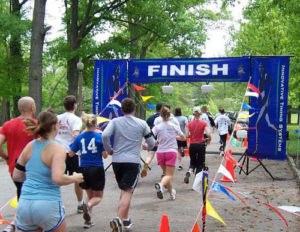 Every year, a local jeweler hosts something called a Diamond Dash. It’s essentially a scavenger hunt, cleverly disguised as an opportunity to win a diamond ring. You pay to enter, and using your phone (to get SMS alerts), and any other means (i.e. bikes/scooters/segways/hoverboards/feet/etc…), you run your butt ragged around a downtown metropolitan area (complete with regular traffic) to find clues and solve riddles, which in turn, earns you points to possibly get a chance to win some cool stuff.
Every year, a local jeweler hosts something called a Diamond Dash. It’s essentially a scavenger hunt, cleverly disguised as an opportunity to win a diamond ring. You pay to enter, and using your phone (to get SMS alerts), and any other means (i.e. bikes/scooters/segways/hoverboards/feet/etc…), you run your butt ragged around a downtown metropolitan area (complete with regular traffic) to find clues and solve riddles, which in turn, earns you points to possibly get a chance to win some cool stuff.
Sounds pretty cool, right? Not when you’re close to 300 pounds and a very competitive couch potato, it seems.
I decided to try my hand at the Diamond Dash one year. I thought, “How fun. This sounds like it might be neato.” I signed up… and did nothing. The dash was over a month away, giving me plenty of time to train and practice… but I didn’t. I drove to the event, lined up with thousands of people (most in some form of workout gear), then proceeded to treat my body like a boxer treats a punching bag. I’m still not sure how I was able to drive home that day.
What happened? I didn’t prepare myself for the actual torture of running back and forth around a semi-large city, competing with others for the same end goal. Did I have fun? To a point. Did I hurt myself? Definitely. Did I learn a lesson? Very much so.
NaNoWriMo is the author’s version of the Diamond Dash. Hundreds of thousands of people churning out words to reach a goal to becoming a ‘winner’. Now, writing is not as physically demanding as running around city streets (unless, of course, you’re lugging an old-fashioned typewriter to Starbucks every day). It is mentally demanding, though. It’s difficult enough to write 50,000 words in one month, but add in life, school, a job, family, friends, schedules, and sometimes elections… and you’re talking about an infinite amount of distraction and things that can tear you completely away from writing those words.
And that’s if you’re prepared. Nano is the main event. It’s the race. Once you’re in, there’s no calling time out or sitting on the sidelines. So, what do you do to prepare?
If you’ve done nano before, you have a pretty good idea of what it entails, so the following advice is more for those that have never done it before:
- Know how you write. Are you a pantser or a plotter? You are most likely somewhere between those two extremes, but it helps to know. Is there enough time for you to build the beginning blocks of your story, or are you going to be spinning your wheels during November, not knowing where to go next? Do you need silence to write? Does your schedule allow you enough time to get those 1,667 words per day in? Do you have a very disruptive family that won’t understand your need to get words down? All of these questions should be asked LONG before nano even starts.
- Are you a writer? Do you write everyday already? If not, do you think you can? Are you a hunter and pecker when it comes to typing? Or, is your only experience with the written word based on your ability to text your friends 500 times a day? Have you had any practice writing prose and building a story from scratch? If you’re choosing to do this on a whim, rethink your decision.
- Is there a possibility of doing a Camp Nano first? The time I’m writing this, we are well into weak 2 of nano… way too late to be asking this question. But every April and July, the same people that run nano also do a camp nano where you can choose the amount of words you’re able to write (a minimum of 10,000, as far as I remember). Plan a short story, or some fanfic. Give yourself the smaller goal to try for, just to see if it’s possible to write during the trials of Real Life™.
- Don’t feel as if you failed if you don’t reach the goal. After all is said and done, nano gives us the opportunity to participate in a difficult challenge. If you even try, you’re technically winning the challenge, because the goal is to write. Too many people talk the talk, but at the end of the day, they aren’t writing.
What’s the point of this rambling post? Nano is a race. Train for it. It’s a month long marathon. Anyone who wants to run a marathon without any kind of training is bound to be getting a ride in the ambulance. You begin your training by starting to run, building up your endurance. You make sure you have the right tools (i.e. workout clothes and shoes). You enter shorter races to judge your ability. You work your way up to the marathon. Do all that, and not only are your chances of finishing better, you’ll also find that you’re going to have a lot more fun doing it.


Leave a Reply